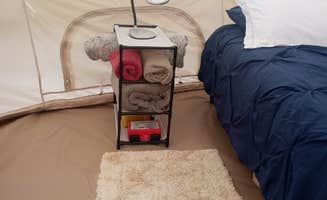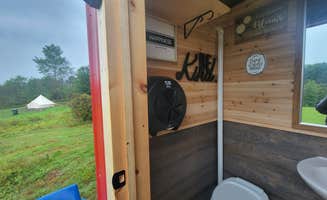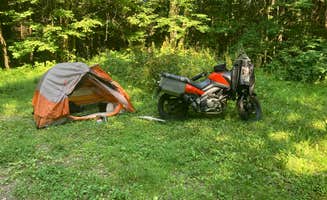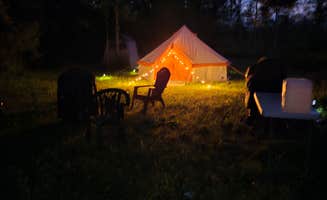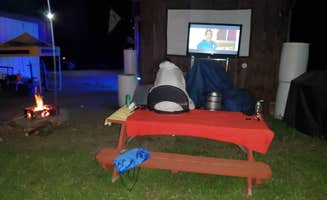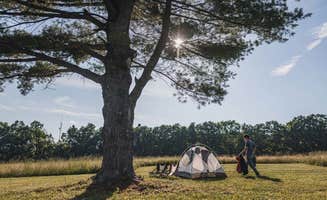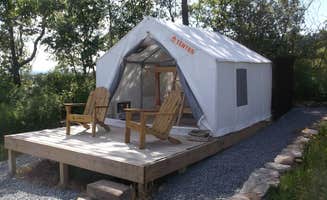Tent camping near Richfield Springs, New York offers varied terrain across elevations ranging from 1,200 to 1,700 feet in the foothills of the Catskill Mountains. The region experiences distinct seasonal changes with summer highs in the mid-80s and frequent afternoon thunderstorms. Area camping options include both established campgrounds with basic amenities and primitive dispersed sites throughout the surrounding state forests.
What to do
Fishing at multiple ponds: The region features several stocked ponds where anglers can catch trout and other freshwater species. At Pharsalia Y Pond, campers find "a deep and clear pond stocked with brook trout" where fishing is limited to "canoe or kayak only." Bird watching opportunities exist along the various state forest roads in the Wildlife Management area.
Cross-country skiing and winter camping: Several areas maintain trails for winter recreation with some offering year-round accommodations. Betty and Wilbur Davis State Park provides "winterized cabins" where visitors can enjoy "a long weekend of cozy cabin time and quiet time outdoors on the winter trails." Winter camping requires proper cold-weather gear and advance planning for potentially limited access.
Hiking the Finger Lakes Trail: This long-distance footpath connects multiple camping areas and provides access to remote tent sites. The trail passes near Bear Wallow Pond where hikers can access "a network of state forest roads that are all part of the Pharsalia Woods Game Refuge" or connect to the "Canasawacta Creek Trail" for additional exploration options.
What campers like
Privacy between sites: Campers frequently mention the seclusion offered at many locations. At Betty and Wilbur Davis State Park, "the small number of cabins and the way they are spread out will make you feel like you are at your own private retreat." The layout provides substantial buffer zones between camping areas, enhancing the wilderness experience.
Free camping options: Several state forests in the region offer no-cost camping with varying levels of accessibility. At Charles E. Baker State Forest, visitors appreciate that it's a "beautiful forest with miles of trails" where camping is available at no charge. A camper noted they "had no problem pitching a tent in a secluded spot in the woods."
Canal-side camping: For a unique experience, tent campers can stay along the historic Erie Canal system. At E16 Canal Lock, "the Canal Corporation provides designated spots for tent and van camping along the canal. Stays are limited to a maximum of 48 hours." Campers must "scan the QR code at the entrance and complete a brief survey" to register their stay.
What you should know
Road conditions: Access to some of the more remote camping areas requires careful navigation. At Duck Pond Campsite, campers warn that "the road in on old cemetery rd was pretty rough" and suggest considering alternate routes carefully as one visitor found the other direction "way worse." Visitors should consider vehicle clearance before attempting access.
Permit requirements: Some camping areas require advance permits that take time to process. For Pharsalia Y Pond, "camping in this DEC Wildlife Management Area campsite is limited, and requires a permit" which should be requested at least "one week" in advance through the regional DEC office.
Variable amenities: Facilities range significantly between locations. Bear Wallow Pond is "a primitive undeveloped campsite, there is a clearing for tenting but no potable water or amenities of any kind." Most primitive sites lack restroom facilities, requiring campers to follow proper sanitation practices.
Tips for camping with families
Playground access: Some locations offer developed recreation areas for children. Betty and Wilbur Davis State Park features "a beautiful picnic pavilion and playground, so kid friendly." These amenities provide entertainment options beyond hiking and water activities.
Glamping options: For families seeking more comfort, several locations offer enhanced accommodations. Grandpa's Back 40 Glamping provides glamping tents with amenities like drinking water, showers, and toilet facilities that can make camping more accessible for families with young children or those new to outdoor experiences.
Swimming alternatives: When camping at locations without swimming access, know your options. While some parks have fishing ponds, swimming may be prohibited. At Betty and Wilbur Davis State Park, "if you want to swim you need to go over to nearby Otsego Lake" instead of using the on-site ponds.
Tips from RVers
Size restrictions: Many camping areas in this region have limitations on RV size and type. At E16 Canal Lock, "RVs and travel trailers are not permitted" entirely, while most primitive sites can only accommodate smaller vehicles or require walk-in access.
Water and electric connections: Limited hookup options exist in the area. Betty and Wilbur Davis State Park offers "electric hookups" including both "thirty-amp hookups" and "fifty-amp hookups" along with "water hookups" for RVs requiring these amenities, though availability may be limited.
Cell service considerations: Connectivity varies significantly throughout the region. One camper at Duck Pond Campsite reported "intermittent cell service which was frightening while driving on these rough roads." At E16 Canal Lock, a visitor noted that "the Verizon signal is good in the area," making it a better choice for those needing reliable communications.


